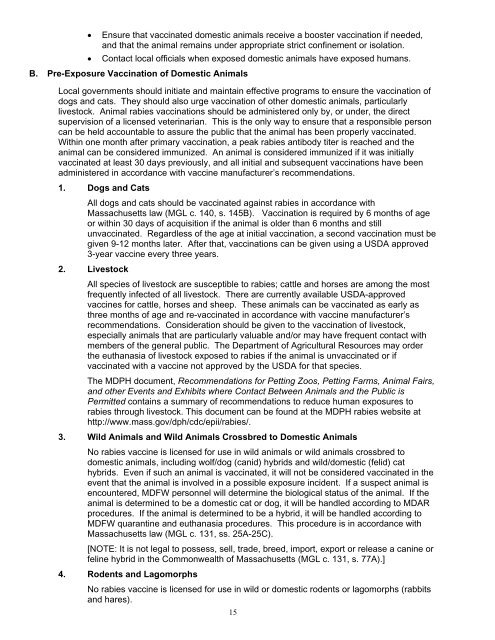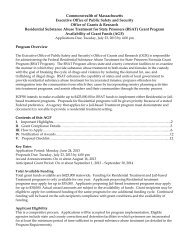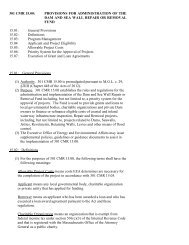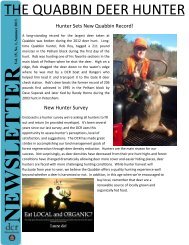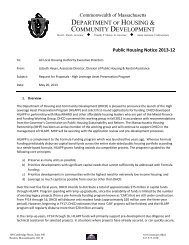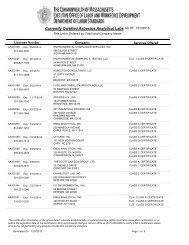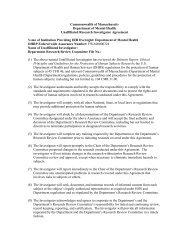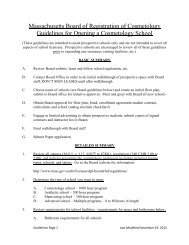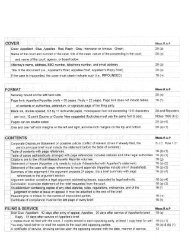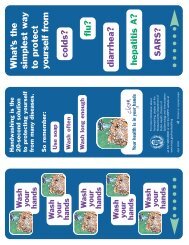Chapter 3: Domestic Animal Issues (PDF) - Mass.Gov
Chapter 3: Domestic Animal Issues (PDF) - Mass.Gov
Chapter 3: Domestic Animal Issues (PDF) - Mass.Gov
You also want an ePaper? Increase the reach of your titles
YUMPU automatically turns print PDFs into web optimized ePapers that Google loves.
• Ensure that vaccinated domestic animals receive a booster vaccination if needed,<br />
and that the animal remains under appropriate strict confinement or isolation.<br />
• Contact local officials when exposed domestic animals have exposed humans.<br />
B. Pre-Exposure Vaccination of <strong>Domestic</strong> <strong>Animal</strong>s<br />
Local governments should initiate and maintain effective programs to ensure the vaccination of<br />
dogs and cats. They should also urge vaccination of other domestic animals, particularly<br />
livestock. <strong>Animal</strong> rabies vaccinations should be administered only by, or under, the direct<br />
supervision of a licensed veterinarian. This is the only way to ensure that a responsible person<br />
can be held accountable to assure the public that the animal has been properly vaccinated.<br />
Within one month after primary vaccination, a peak rabies antibody titer is reached and the<br />
animal can be considered immunized. An animal is considered immunized if it was initially<br />
vaccinated at least 30 days previously, and all initial and subsequent vaccinations have been<br />
administered in accordance with vaccine manufacturer’s recommendations.<br />
1. Dogs and Cats<br />
All dogs and cats should be vaccinated against rabies in accordance with<br />
<strong>Mass</strong>achusetts law (MGL c. 140, s. 145B). Vaccination is required by 6 months of age<br />
or within 30 days of acquisition if the animal is older than 6 months and still<br />
unvaccinated. Regardless of the age at initial vaccination, a second vaccination must be<br />
given 9-12 months later. After that, vaccinations can be given using a USDA approved<br />
3-year vaccine every three years.<br />
2. Livestock<br />
All species of livestock are susceptible to rabies; cattle and horses are among the most<br />
frequently infected of all livestock. There are currently available USDA-approved<br />
vaccines for cattle, horses and sheep. These animals can be vaccinated as early as<br />
three months of age and re-vaccinated in accordance with vaccine manufacturer’s<br />
recommendations. Consideration should be given to the vaccination of livestock,<br />
especially animals that are particularly valuable and/or may have frequent contact with<br />
members of the general public. The Department of Agricultural Resources may order<br />
the euthanasia of livestock exposed to rabies if the animal is unvaccinated or if<br />
vaccinated with a vaccine not approved by the USDA for that species.<br />
The MDPH document, Recommendations for Petting Zoos, Petting Farms, <strong>Animal</strong> Fairs,<br />
and other Events and Exhibits where Contact Between <strong>Animal</strong>s and the Public is<br />
Permitted contains a summary of recommendations to reduce human exposures to<br />
rabies through livestock. This document can be found at the MDPH rabies website at<br />
http://www.mass.gov/dph/cdc/epii/rabies/.<br />
3. Wild <strong>Animal</strong>s and Wild <strong>Animal</strong>s Crossbred to <strong>Domestic</strong> <strong>Animal</strong>s<br />
No rabies vaccine is licensed for use in wild animals or wild animals crossbred to<br />
domestic animals, including wolf/dog (canid) hybrids and wild/domestic (felid) cat<br />
hybrids. Even if such an animal is vaccinated, it will not be considered vaccinated in the<br />
event that the animal is involved in a possible exposure incident. If a suspect animal is<br />
encountered, MDFW personnel will determine the biological status of the animal. If the<br />
animal is determined to be a domestic cat or dog, it will be handled according to MDAR<br />
procedures. If the animal is determined to be a hybrid, it will be handled according to<br />
MDFW quarantine and euthanasia procedures. This procedure is in accordance with<br />
<strong>Mass</strong>achusetts law (MGL c. 131, ss. 25A-25C).<br />
[NOTE: It is not legal to possess, sell, trade, breed, import, export or release a canine or<br />
feline hybrid in the Commonwealth of <strong>Mass</strong>achusetts (MGL c. 131, s. 77A).]<br />
4. Rodents and Lagomorphs<br />
No rabies vaccine is licensed for use in wild or domestic rodents or lagomorphs (rabbits<br />
and hares).<br />
15


